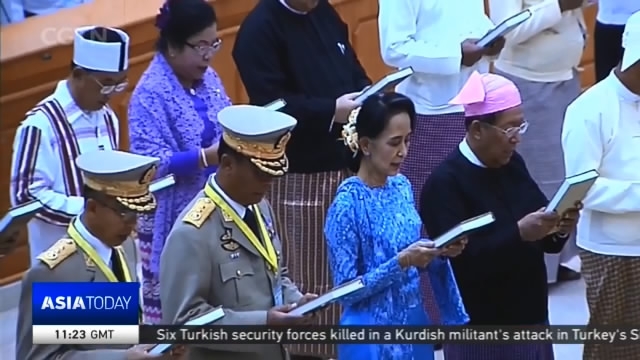
19:57, 30-Mar-2018
Myanmar Politics: Two years on after military rule ended

Two years ago today Myanmar instituted a civilian government. During the ongoing transition, the country has continued to make headlines, but for very different reasons. Dave Grunebaum takes a closer look at how the civilian government has fared so far.
Hopes were high when Aung San Suu Kyi and her colleagues in the National League for Democracy were sworn into office in March 2016. That ended decades of complete military rule in Myanmar. Two-years later, the NLD-led civilian government is struggling to meet expectations.
MYAT THU YANGON SCHOOL OF POLITICAL SCIENCE "NLD has done many good things especially for the corruption or something like that so you will see that the procurement system becomes much better than it was before. But at the same time many people feel that the economic situation in the country doesn't make progress."
SAW KAPI SALWEEN INSTITUTE "We expected they would probably be able to do a lot in education sector, health sector or economic sector. But we haven't seen a lot of changes or improvement in those areas."
State Counselor Aung San Suu Kyi is the de facto head of state. Many observers believe she needs to delegate more authority so that key-decisions can be made faster.
MYAT THU YANGON SCHOOL OF POLITICAL SCIENCE Daw "Aung San Suu Kyi needs to make some decentralization or give power to the people in key positions so that she can focus more on foreign affairs and also the national reconciliation process."
But the news in this Buddhist-majority country that has grabbed the most international attention is the crisis in Rakhine State. Almost 700-thousand Rohingya Muslims have fled to neighboring Bangladesh after militant attacks sparked a military crackdown. The United Nations accuses Myanmar's army of ethnic cleansing-accusations it denies.
DAVE GRUNEBAUM YANGON Under Myanmar's Constitution, the civilian government has no authority over the country's security forces. But Aung San Suu Kyi faces harsh criticism from abroad for not taking a public stand against the military.
SAW KAPI SALWEEN INSTITUTE "It is difficult to think that she agrees with the military in my opinion. But I think, I'm not exactly sure the reason why she didn't stand up to the military but at least we can say it is because she has become a politician. It is probably the political risk that she calculated that it is probably not in her interest to stand up to the military."
As the civilian government begins its third year questions remain about how it will handle the economy, social services, armed conflicts and its complicated relationship with the military. Dave Grunebaum, CGTN, Yangon.

SITEMAP
Copyright © 2018 CGTN. Beijing ICP prepared NO.16065310-3
Copyright © 2018 CGTN. Beijing ICP prepared NO.16065310-3